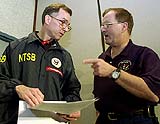 Greeneville heard other ships before accident Greeneville heard other ships before accident
 Relatives of those missing want sunken vessel raised Relatives of those missing want sunken vessel raised
 Video of victims' families news conference Video of victims' families news conference
 Graphic: Searching for the Ehime Maru Graphic: Searching for the Ehime Maru
 Japanese town leaders demand U.S. apology Japanese town leaders demand U.S. apology
 U.S.-Japan alliance not threatened, says official U.S.-Japan alliance not threatened, says official
 Kaua'i Visitors Bureau makes, accepts donations for families Kaua'i Visitors Bureau makes, accepts donations for families
 Tribute to the Missing Tribute to the Missing
 Previous stories Previous stories
Associated Press
WASHINGTON — For the National Transportation Safety Board, the spotlight of publicity is the only real power it has to force changes meant to prevent accidents. The Navy can order changes but would rather wait until the facts are in before talking about results.
 |
| The NTSB’s John Hammerschmidt, left, and Jim Scheffer confer before disclosing plans to talk to civilians who were on the USS Greeneville.
Associated Press |
The contrasting approaches are starkly evident in the agencies’ separate investigations into how a U.S. submarine hit and sank a Japanese fishing vessel nine miles south of Diamond Head.
"It’s more a matter of different cultures," said Michele Flournoy, a senior adviser with the Center for Strategic and International Studies, a Washington think tank. "The military tends to want to have the whole story and make sure they have the story right before they go public. The NTSB has a different culture: Even when you don’t have much to say, say something."
NTSB officials say their credibility lies in a willingness to conduct investigations in the open, disclosing information as it develops.
"The strength of our ability to actively improve transportation safety is based on our reputation for openness, evenhandedness and technical accuracy," agency spokesman Ted Lopatkiewicz said. "The way to do that is to make your investigation as transparent as possible."
Former NTSB Chairman Jim Hall acknowledged that tensions may arise between the board and the military during investigations.
"The best procedure is to cooperate with the investigative agency and provide all the information," Hall said. "It is their responsibility to provide that information to the public."
In this investigation, it sometimes has worked the other way. The Navy didn’t tell the NTSB that civilians were at two control stations when the attack submarine USS Greeneville smashed into a Japanese fishing vessel. Safety board investigators learned of it only when journalists asked about reports they had heard.
Rear Adm. Stephen Pietropaoli, the Navy’s chief of information, said the service and the NTSB have different roles and therefore different policies regarding the release of information.
"In the Navy, we not only have to find out what happens, we’re responsible for making it work afterward," Pietropaoli said. "It’s critical for us, as both the investigators and the people who have to make it right, that we safeguard the integrity of the process, or we could be constrained in what steps we can take later.
"It’s different. I know it’s difficult for people to understand."
Pentagon officials said a preliminary Navy investigation of the submarine collision may be finished within days.
Even so, the Navy is taking a public relations hit by not being as informative as the safety board, said Leonard Steinhorn, a professor of communications at American University.
"There’s an irony that the Navy, which used its submarine for public relations purposes, is now stonewalling the press and undermining whatever good will it could have had by getting this story out and addressing it straightforwardly," Steinhorn said.
"Unfortunately, a military that felt burned during Vietnam is very nervous about airing its dirty linen in public. That mentality is still very strong in the United States military today, to its own detriment."
Others noted that the Navy, while it may not release details of its investigation, isn’t covering up a major scandal either.
"Most Americans know what happened," said Michael O’Hanlon, a senior fellow with the Brookings Institution, another Washington think tank. "They know that just a couple of bad apples out of a Navy of close to 400,000 performed extremely badly. It’s a fairly simple story. It’s just an incredibly regrettable and preventable human tragedy."
The Navy probably will be even more cautious now that President Bush, the commander in chief, has asked the Pentagon to review its policy on civilian participation, Flournoy said.
"That really increases the political pressure on the Navy and the risk for them," she said. "It’s only going to make them more sensitive of how they’re going to handle this."
The NTSB’s Hall said the military in most cases should be as forthcoming with its information as the safety board.
"During peacetime, military investigations should be subject to the same type of rules," he said. "American tax dollars fund all of these systems. Unless there is some sort of security reason, there is no reason this information should come out in drips and drabs to the American people."
[back to top] |


